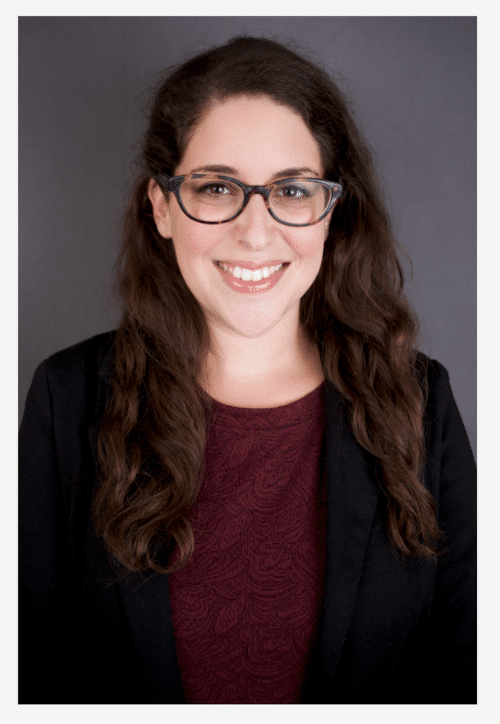
Nicole Nissim
Editor’s Note: Nicole Nissim, PhD, is a 2021 Christopher M. Clark Scholar. She accepted a new position at the Mayo Clinic in Jacksonville, Florida, and PMC is excited to highlight Dr. Nissim’s journey and contribution.
By Meg McCarthy
The human brain is like a football team, made up of complex parts that serve different functions for a common goal.
In this analogy, neuroplasticity is a sense of teamwork: if one “player” is injured, others adapt from their prior functions to better serve the team.
This concept of neuroplasticity was introduced to Nicole Nissim, PhD, during her undergraduate career at the University of Florida. After taking a physiological psychology course, she was inspired.
“I was really fascinated by neuroplasticity, the fact that it naturally occurs, and that there are ways to improve it,” said Dr. Nissim.
Neuroplasticity is particularly important for individuals with brain damage, which can result from short-term events such as having a stroke to long-term disease such as mild cognitive impairment (MCI).
After graduating with her bachelors in psychology, Dr. Nissim researched the effects of noninvasive brain stimulation on brain function and behavior. Specifically, she studied the impact of transcranial direct current stimulation (tDCS) on healthy brain aging while working with Adam Woods, PhD, at the University of Florida.
“Towards the end of my time as a graduate student, I knew I wanted to continue working in the field of noninvasive brain stimulation and expand my knowledge of different techniques that could be applied in patient populations,” said Dr. Nissim.
For her post-doctoral fellowship, Dr. Nissim joined the University of Pennsylvania through a dual-collaboration in the Department of Neurology and Philadelphia’s Moss Rehabilitation Research Institute.
Since then, she has collaborated with Roy Hamilton, MD, MS, and Branch Coslett, MD. Together, their research focuses on how noninvasive brain stimulation can help various patient populations.
“This experience allowed me to branch out and learn how to apply noninvasive brain stimulation techniques in patient populations with neurodegenerative disease or brain damage due to stroke,” said Dr. Nissim.
Specifically, Dr. Nissim works with patients who have language disorders like aphasia, which is difficulty in producing or understanding language, caused by stroke or neurodegeneration.
It was Dr. Hamilton who encouraged Dr. Nissim to apply for PMC’s Clark Scholar Program.
“Nicole has been a great addition to our research team. She brought an understanding of how neuromodulation technologies like transcranial direct current stimulation (tDCS) can be used to enhance neuroplasticity in the aging brain, and has helped expand this work to include newer brain stimulation technologies and to persons with neurodegenerative disorders,” said Dr. Hamilton.

Nicole Nissim
After being accepted in 2021, the broad goal of her work is to develop brain stimulation interventions for individuals with MCI or neurodegenerative diseases to delay further disease progression.
Remember the football analogy? Noninvasive brain stimulation is like football practice. It promotes better teamwork, or neuroplasticity, within your brain’s various regions.
“Often, a lot of MCI patients go on to develop Alzheimer’s disease,” said Dr. Nissim. “Our goal is to identify interventions to delay disease progression and slow further decline.”
As a Clark Scholar, Dr. Nissim has enjoyed multidisciplinary collaboration at PMC.
“It’s been an amazing program to be a part of. I’ve learned so much, in terms of diagnosing these disorders and understanding neuroimaging biomarkers, through weekly consensus meetings and different didactics,” said Dr. Nissim.
When asked about what excites her most, Dr. Nissim said it boils down to three things: developing research projects, data analyses, and connecting with her participants.
As her scholarship finishes this summer, Dr. Nissim has exciting plans ahead. At the Mayo Clinic, she will focus on biomarker research. One day, she hopes biomarkers will be used to better identify individuals who may benefit from noninvasive brain stimulation.
“She’s an excellent scientist and delightful person. We wish her well on her future endeavors and know that she will be sorely missed,” said Dr. Hamilton.
While her time at Penn is ending, Dr. Nissim is very grateful for the opportunities the Clark Scholars Program has provided her.
“It’s been really pivotal to my growth and professional development. As a scientist, I’m really grateful to be a part of it.”